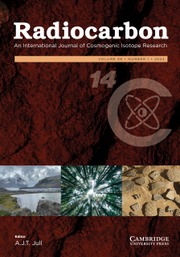Crossref Citations
This article has been cited by the following publications. This list is generated based on data provided by Crossref.
Rasmussen, Kaare L
van der Plicht, Johannes
Doudna, Gregory
Cross, Frank M
and
Strugnell, John
2003.
Reply to Israel Carmi (2002): “Are the 14C Dates of the Dead Sea Scrolls Affected by Castor Oil Contamination?”.
Radiocarbon,
Vol. 45,
Issue. 3,
p.
497.
Lund Rasmussen, Kaare
van der Plicht, Johannes
Doudna, Gregory
Nielsen, Frederik
Højrup, Peter
Halfdan Stenby, Erling
and
Th Pedersen, Carl
2009.
The Effects of Possible Contamination on the Radiocarbon Dating of the Dead Sea Scrolls II: Empirical Methods to Remove Castor Oil and Suggestions for Redating.
Radiocarbon,
Vol. 51,
Issue. 3,
p.
1005.
Brock, Fiona
2013.
Radiocarbon Dating of Historical Parchments.
Radiocarbon,
Vol. 55,
Issue. 2,
p.
353.
Kasso, T M
Kytökari, M
Oinonen, M
Mizohata, K
Tahkokallio, J
and
Heikkilä, T
2023.
A GLANCE TO THE FRAGMENTA MEMBRANEA MANUSCRIPT COLLECTION THROUGH FTIR AND RADIOCARBON ANALYSES.
Radiocarbon,
Vol. 65,
Issue. 1,
p.
155.


